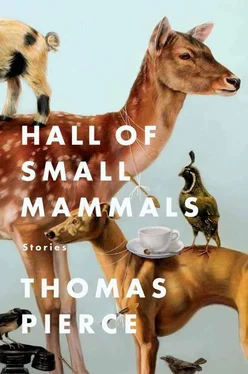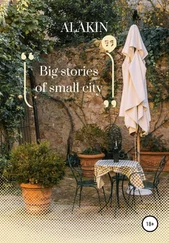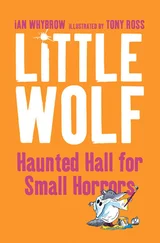• • •
Back in the car again, his wife was irate. She couldn’t believe Bert had gone upstairs and risked exposure. He’d put them both in danger, and for what? “Truly idiotic,” she called it, and rolled down all the windows in the car, as if a little fresh highway air might forestall any disease he’d contracted. When they got home she ordered him into the shower and dumped cleaning chemicals and powders all over his head and back. She scrubbed him, though from a safe distance, with a long rough brush. He endured this without complaint, though the smell of the bleach made his eyes water and his skin itch. That night he broke out in a splotchy rash that his wife was positive had nothing to do with the chemicals. She was certain it was the first of many future symptoms.
“This is crazy,” he said. “If they were really worried about contamination, they would have done more than put up a sheet of plastic.” Partly, he was saying this to reassure himself. “Trust me. I’m fine.”
“For now,” she said. “For now you are.”
She watched him closely over the next few days, insisting that he sleep on the couch and eat his meals on the back deck. When he still wasn’t dead at the end of the week, she allowed him into their bed again.
“Aren’t you glad to have me back?” he asked, caressing her leg and sneaking his fingers under her slip.
“No, thank you,” she said, and knocked his hand away. “None of that just yet.”
“I never should have told you I went up to that apartment.”
“Poor baby,” she said, and then asked that he please stay on his side of the bed. “For now.”
• • •
Mrs. Oliver called again, finally, to report that Rob was no longer being held in Australia. They’d moved him briefly to a facility in Russia, where his body had been frozen and sealed in some sort of space-age container (the device had an unpronounceable Russian name), and after that, they’d moved him again, this time to an undisclosed location with heavy security. His brother, it seemed, was destined to be a traveler both in life and death.
“I’m sorry,” Mrs. Oliver said. “I know this must be strange for you. But they had to take precautions. One of the pathologists in Sydney, she died.”
“God. From the same thing as my brother?”
“It’s looking that way, yes,” Mrs. Oliver said. “She didn’t show up to work. They found her at home in front of the television. They’re still not sure how it was transmitted.”
Bert hadn’t told Mrs. Oliver about his visit to Rob’s apartment. The last thing he wanted was to wind up in some sort of quarantine.
“Am I ever going to see my brother again?” he asked.
“The honest answer,” she said, and sighed, “is that it’s looking less and less likely. Basically, at this point, he is the disease, you know?”
So, it had come to that. His baby brother, the disease. His baby brother, the human infection.
Rob hadn’t been the easiest person in the world to get along with, but surely he didn’t deserve this sort of treatment, being frozen and shipped all over the world as a scientific curiosity.
Mrs. Oliver was saying goodbye when Bert asked again about his theory, about the chances that Rob had contracted a long-dormant disease while down in one of the mines (a theory that, if true, would surely implicate the company to some degree). Mrs. Oliver, her voice deep and warbled, said, “Mr. Yaw, please, we just don’t know. You’d be astounded by how little we know. By how many theories there are! It’s a very sensitive case. It’s not for nothing that we want to keep this out of the news.”
All along Bert had understood the need for discretion. According to Mrs. Oliver, her updates were hinged on him not passing information along to anyone. She trusted him, she said, to keep this confidential, though exactly how confidential she never specified. That left him in a difficult position with friends who’d met his brother over the years and who sensed that Bert was withholding crucial details about Rob’s death. He was never quite sure how much to reveal to people. It was a concern, however, that Delia didn’t seem to share.
“They’ve got him on ice,” she told some of their friends over wine one night. “He’s contagious. No one can go anywhere near him.”
“Contagious with what?” their friends asked, impressed by the drama.
“Bert thinks it’s some kind of Jurassic flu,” she said, turning to him. “Right?”
“I have no idea what it is.”
“What will they do with the body next?” the friends asked then.
“What will they do?” Delia asked Bert.
“Your guess is as good as mine.”
She looked at him, flustered. “Anyway,” she said, “it makes it hard to get any closure. The least they could do is burn a finger or a toe, and send us some ashes. Then we’d have something to bury and pray over. Wouldn’t that help, Bert?”
Bert wasn’t sure if that would bring him any peace. He thought of his parents’ graves. They were buried near their church in one of the greenest and most immaculate cemeteries Bert had ever seen. “They only keep it like this,” his brother had once noted, “because they really do think all these bodies will get raised from the dead someday. They really think everyone will come popping out of these perfect little graves. To meet Jesus, I guess.” It was an unappealing idea, Bert admitted, your soul like a nice clean hand jammed back into a dirty wet garden glove. It was one thing for Jesus to bring back Lazarus after only a few days in the tomb, but say you’d been dead for a thousand years, say your ashes had been dumped into the sea and swallowed by tuna and served up as sushi. What then? Sure, Bert could imagine a scenario in which all the elements that once constituted a body were instantaneously re-formed into the original body-shape, but what about the fact that atoms got recycled over time? No doubt his own body contained more than a few atoms that had already belonged to previous souls, and so who would have dibs come Judgment Day — the first claimant, or the holiest? It was a silly question, of course, but that was the problem with believing in anything too specific . Bert had long ago dropped his parents’ church for his wife’s uncharismatic Episcopal one, a church whose priest counseled people not to focus too much on the machinery of it all.
As far as Bert knew, Rob had not belonged to any religion at all when he died. “Quickest way to figure out a church,” he remembered Rob saying once. “Go to their website and Control-F for the words inerrant and infallible .”
Delia took another long sip of wine, eyes flicking back and forth between Bert and their friends. She was still waiting for him to respond. “Would it help if they sent you a toe to burn?” she asked again. “Though I guess it’s not like y’all were especially close.”
“We were close enough,” Bert said.
“News to me,” she said, then, “Sorry.”
Bert stayed quiet and sullen for the rest of the night. Delia had said too much about Rob’s condition, but he didn’t want to let on in front of their friends. She glanced over at him every so often, her eyes half closed and soft, her way of trying to communicate an apology.
“Don’t act like it’s top secret,” she said in the car on the way home. “It’s not. You haven’t signed anything. And frankly I think it’s a little odd how you’re suddenly so insistent that you and Rob were such bosom buddies.”
“Brothers don’t have to talk on the phone twice a week to be close,” he said. Delia was on the phone with her family constantly.
“Listen, there’s no need to play this game with me,” she said. “We both know what your brother was like. He was an asshole, okay? Don’t look at me like that. I’m sorry, but he was. Your parents let him get away with everything. Remember when he wrecked your Jeep and almost killed that stupid girl he was dating, and what did your parents do?”
Читать дальше












